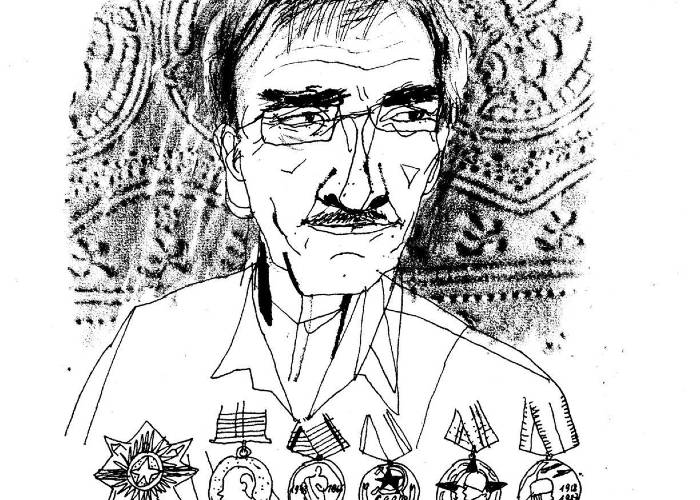About the Author:

Evgeny Pinelis.
New York, USA
Evgeny Pinelis is an intensive care physician, and specialist in pulmonary medicine in New York. He has authored a book about working with patients during COVID.

It was boring and very hot in Rehovot. Dad worked at the Weizmann Institute, and Mom was enjoying a break from her ear-throat-nose patients, walking in parks and shopping, all of which I had absolutely no interest in. We didn’t have a computer with games. The Teenage Mutant Ninja Turtle that I had spent two weeks tediously begging my parents to buy me, was not so interesting after all; the Lego sets were too expensive. An unkind sabra in a toy store hated me and was annoyed by the phrase I had said in broken Hebrew: “how much does it cost?” All the books from Moscow had long since been read; the sea was far away from Rehovot, and my mother wasn’t too keen on going there anyway. Our vacations were becoming more and more disgusting. But finally, with a bit of luck, I found a stack of magazines that had apparently been left over by earlier residents. They had interesting stories from World War II and the Cold War, printed on cheap paper, a horrible samizdat design. In 1993, there could have been anything left over after Russian business travelers, including a selection of “Megapolis Express” with stories of starving children eating a teacher. But instead, I read about a fake landing trick in Sicily, Enigma, Turing, and Stanislav Petrov.
I arrived in Rehovot as a depressed thirteen-year-old boy who had learned that he would probably not live to be sixteen. And not just me, but the whole world. Shortly before the trip, I watched “The Prophecies of Nostradamus” on Perovsky cable channel. The movie was old. We were just discovering the world of Hollywood movies, and we spoke using ridiculously translated quotes from “Terminator” and “Rambo”. For an hour and a half, the interpreter’s nasal voice was informing us how a medieval monk predicted, in confusing verse, all the important events from the fifteenth century to the present day. For a dramatic ending, they left the prediction of the future that concerned them, in the eighties. Eerie music played as they showed a fiery whirlwind sweeping away everything in its path. Ballistic missiles flew, cities crumbled down into ashes, and crowds of people were burned to death. The leader of all this chaos was a Middle Eastern-looking man, whose face, I am almost certain of it, was used to illustrate the cover of some fantasy book that was popping up in all bookstores at the time. The end of the world was set to take place in 1993. I cried for two days after watching it. There was no reason to live. I had no doubt that there was no chance Moscow would be left untouched by this catastrophe. Why do anything at all if everything will be over in less than a year?
And then, in one of the magazines left in our official apartment for business travelers, I came across a story called “The Day of the Third World War”. In 1983, objects appeared on Soviet radar network, and with a very high degree of probability, they were declared ballistic missiles fired toward the Soviet Union. Captain Stanislav Petrov, a missile forces officer, was on duty that night. The Americans also saw objects flying toward the USSR and were waiting for the Soviets’ response, undoubtedly getting ready to fire something at us, too. Soviet big bosses were calling each other, trying to find the person responsible for a counter-launch decision. It was Petrov who ended up being responsible. He was supposed to give the order, but instead he trusted his intuition, locked himself in his office and waited for the apocalypse. The objects disappeared from radar screens; the planet was unharmed. There is still some debate about what it was. Was it a meteor shower? Space waves? Some otherworldly thing? I didn’t care, I had it all figured out. The apocalypse was set by Nostradamus not for 1993, but for ten years earlier. The interpreters simply got the year wrong. Or they changed the year in that movie for greater effect. But our Captain Petrov was so good, he defeated that bitter, medieval old man and prevented a catastrophe. I ran around the room with joy; life made sense again; the hated Rehovot suddenly seemed beautiful to me. I reread the story sixty times, finding confirmation for my anti-Nostradamus theories and looking confidently into the remaining months of 1993, no longer expecting a nuclear catastrophe.
We returned to Moscow in late summer. School began soon. In our English class we were being taught the subjunctive mood of the gerund or some other incomprehensible nonsense which discouraged students from communicating in foreign languages. We had to make up a question about how something was supposed to happen but didn’t. When it was my turn, I said, “When did the world end because of nuclear war?” I wanted to ask the question some other way, but it came out clumsily, since my conjugation skills were underdeveloped at the time.
My teacher, a brilliant educator, began mocking me and urging my classmates to make fun of me. I was rude in response, and so I was kicked out of class. The school called my father, who was already used to it all, to come in yet again. Calm as usual, he listened to the vile accusations, promised to deal with me (which usually meant that he would tell me, tiredly, in the evening, not to do it again), and then went back to work, where he continued to study neurons. Tatiana Zakharovna did not believe him at all and did not let it go until I had been sent to the assistant principal’s office. In the assistant principal’s office, I yelled, in tears, that if it hadn’t been for our Captain Petrov, we wouldn’t even be having this conversation. I was kicked out of school anyway, though for a different reason, a year later.
Strange as it may seem, my interactions with Stanislav Petrov did not end there but continued exactly twenty years later, in New York. We were enjoying our first year in the great city. I worked in a hospital, and my wife worked at the Metropolitan Museum of Art. I was terribly jealous of her. She talked about going to restorations, about being surrounded by all sorts of masterpieces in some basement, about attending all the exhibitions before they were open even for members, and being part of a circle of very interesting and colorful acquaintances. A favorite character in her stories was Teresa, the head of one of the departments. Teresa was the one who invited us to the premiere of a film directed by her husband. My wife told me the plot of the upcoming movie, the way she remembered it, and I immediately realized that it was about Stanislav Petrov. My erudition surprised her. She told Teresa that I knew this story. Teresa was surprised, too. Most of the people she knew had no idea what happened in 1983. I, in turn, wondered why Stanislav Petrov had suddenly become the hero of a film by a New York expat from Copenhagen. It turned out that Christian, Teresa’s husband, upon hearing about Stanislav Petrov, admired him so much that he found the captain, who had been withering away after the death of his wife and his retirement from the missile forces in a one-room apartment in Fryazino. Thanks to Christian, Petrov was suddenly remembered, awarded a peace prize, and invited to speak at the UN. Upon learning that he was going to America, this man who had prevented the deaths of hundreds of millions, shared his cherished dream: to meet Kevin Costner. After the UN, he was taken across America, where he would meet many different, often quite random, people, and the end of trip took place in Kevin Costner’s mobile home on a set of another movie. The unhappy old man cried, his dream has come true, an embarrassed Kevin Costner was saying thank you. The trip became the basis for this movie, titled almost like a David Bowie song (finding out that it was a Bowie song and not Nirvana was one of the major revelations of those growing up in the ’90s in Russia): “The Man who Saved the World.” The film was good, honest, and moving. Before the end credits rolled, we watched Petrov go back to his crumbling apartment, and when the end credits were over, we went to drink champagne and eat canapés in the lobby of the old West Village movie theater. In May 2017, Petrov died, completely forgotten, in his old apartment. Meduza reported on his death only three months later. Other media outlets did not even mention him.
Translated from Russian by EastWest Literary Forum

Evgeny Pinelis is an intensive care physician, and specialist in pulmonary medicine in New York. He has authored a book about working with patients during COVID.
This excellent anthology, compiled and edited by Julia Nemirovskaya, showcases poems by Russian (and Russian-speaking) poets who express their absolute rejection of Russia’s war against Ukraine.
The documentary novel “The Tenth Circle” tells the story of the life, struggle, and destruction of the Minsk ghetto, one of the largest in the Soviet Union and Europe during World War II. (Russian edition)
“Monkey’s Defense” is a collection of short stories and parables by Nina Kossman, bilingual author of several books of poetry and prose and translator of Marina Tsvetaeva’s poems into English.